|
No number of
rejections could dampen Chris Soentpiet's determination to succeed
and put his artwork forward. Even after being refused by more than
10 publishers when a fresh-faced college graduate, he continued
pounding the pavement. "I kept going because I wanted to eat,
I needed a job," he says. Today, Soentpiet is one of the most
lauded children's book illustrators. His remarkable titles include
Peacebound Trains by Haemi Balgassi, So Far From the Sea and Jin
Woo by Eve Bunting and Molly Bannaky by Alice McGill.
Dear Santa,
Please Come to the 19th Floor is his 15th title, and his second
collaboration with his wife and business partner, whose pen name
is Yin. The delightful, engaging book about two young boys living
in a housing project who have a memorable encounter with Santa,
is based on Yin's growing up on the 19th floor of a Lower Manhattan
apartment.
The couple's
first collaboration, Coolies, based on Yin's Chinese American ancestors
who helped build the transcontinental railroad, won the Parents'
Choice Foundation's Gold Award for Best Picture Book in 2001 and
was named an ALA Notable Book and an IRA Children's Book Award winner
in 2002.
Soentpiet, who is a Korean-born adoptee, discovered watercolors
in a high-school art class. His art teacher was so impressed that
he secretly sent out Soentpiet's work to art schools around the
country and helped him get a scholarship to the prestigious Pratt
Institute in Brooklyn. Soentpiet thought he might be a commercial
artist until he met illustrator Ted Lewin, who encouraged him to
illustrate children's books and the rest, as they say, is history.
"That was nearly 10 years ago," says Lewin, "and
his 'fire in the belly' has not cooled. His work continues to amaze."
AsianWeek: How much of your Korean or your adoptive background
gets played out in your books?
Chris Soentpiet: Being adopted has more of an impact on my
illustrations than being Korean. I say that because being adopted
gave me an opportunity to see the world. Before that, I only knew
my childhood in Korea. When I came to America, it was a whole new
experience, from Hawaii to Oregon to Alaska, then back to Oregon,
and now here I am in New York. Traveling really broadened the way
that I illustrate. I always wanted to expand. I didn't want to be
typecast, to be seen as only as an Asian person. Being adopted -
my mother is Irish/German, my father is Dutch, and my baby brother
is Hawaiian - our family feels like it's the United Nations. So
I never thought about just doing Korean books. I always wanted to
draw all sorts of other people.
AW: Do you have an illustrating process?
CS: My illustrating process is extensive. Once I get a manuscript
from a publisher, I start with thumbnail sketches. No one really
sees these except for myself. I work out each scene and figure out
what the models will do. I gather costumes and do historical research,
usually with my wife. Then I start looking for the right models
and end up doing about five hours worth of photo sessions. From
there I make final pencil sketches, and that's what the publisher
sees. These are very detailed sketches, so we're all very clear
on what's going into the book. My final paintings are basically
color versions of those black and white sketches. I spend about
five months doing the 18 to 20 paintings required for a book.
AW: Do you have a favorite among your many titles?
CS: I do have favorites, although because I work so hard
on all of them, I feel like each of them are my babies. But I do
like Jin Woo and Coolies - Jin Woo because I was adopted so it's
a very personal story, and Coolies because it's about my wife's
ancestry. Every time I do a book, I feel like I become a specialist,
a scholar in that topic because I have to find out so much about
each subject so I can try and bring the details to life.
AW: What would you tell a new illustrator starting out?
CS: It's going to be hard and you're not going to get the
types of projects you're hoping for or the money right away, but
take on the smaller jobs, take anything because that's how you will
learn. Don't quit, and keep at it.
There was a time that I thought about quitting - I really did live
that life of a starving artist. And it was really, really hard.
But luckily I stuck with it - the bigger the risk, the bigger the
reward. My wife and I are very fortunate to have this lifestyle
- we work from home, we take the summers off, but that's after 10
years of doing this. We've put in our time.
AW: I understand you do a lot of school visits with young
kids. What inspired those visits? What keeps you involved?
CS: Once the book is out, you have to go out and promote
it. So I started out going to bookstores and libraries. Then schools
began inviting me. Once I started, I could see the impact my visits
had on the kids. I live in New York, but when I go out to rural
areas, there's often the one Asian kid, if any at all. And I always
notice that one Asian kid - and that's the kid who always pays the
most attention, sits up straight and listens to every word. Those
kids remind me of me. I know I'm actually impacting these kids.
A gesture or something I say, they really catch on. I can get sidetracked
day to day, painting or dealing with editors and publishers, but
the kids bring you down to earth.
AW: What would you want your own children to learn from your
books?
CS: We don't have kids yet but when we do, the first thing will
be that I am so proud of the fact that I'm doing kids' books, and
that there is nothing that I'm doing in the books or in my life
that I would ever be ashamed of. I would be honored and proud to
show my books to my kids. I also want them to see, by my example,
that they can make a living doing what they like, that they don't
have to compromise their ethics.
That's one of the big perks that we have, knowing what we're doing
impacts kids in a positive way. If we keep that in mind, then every
day feels good. And we'll be able to show our kids these books,
and each book will have a different lesson to learn.
AW: What are you working on next?
CS: I just finished My Brother Martin [due out later this
fall] about Martin Luther King Jr. My wife and I are working on
a sequel to Coolies, which will focus on the Irish contributions
to building this country. And I'm starting a very small, quiet book,
Saturday and Teacakes, about a family in the South, written by Lester
Laminack.
I have a policy of not communicating with the authors [when immersed
in the illustration process]. The book comes out so much better
if we don't talk about it. If I have questions, then the publisher
relays messages. Of course, working with my wife is the exception.
-TERRY HONG
|
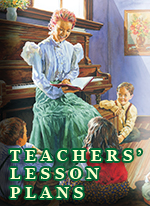
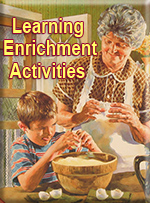
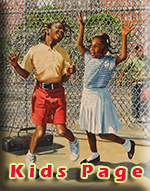
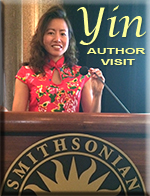
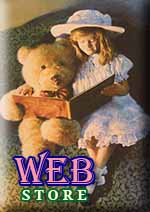
 Picturing the Worlds of Chris Soentpiet
Picturing the Worlds of Chris Soentpiet